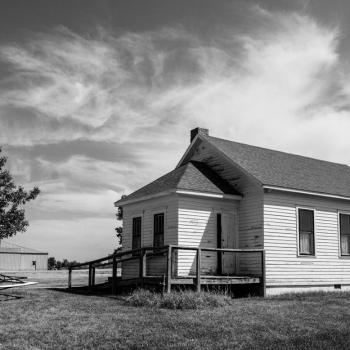I see enough continuity between the Old World and the New World Yoruba religion to use one name for this section of the book. I know some scholars will disagree with me. But, I would argue there are probably fewer continuities between contemporary American Southern Baptists and traditional Russian Orthodox than there are between Yoruba practitioners in Nigeria and Santeria practitioners in New York City.
I'm asking about this because your own book's major theme is: Don't lump religions together. Can we tell readers roughly where this unifying movement began? We might go back to William Blake in the 1700s or the Baha'i movement in the 1800s. We might pick a number of other starting points.
The origins of this contemporary idea of religions being one, I think, comes to us through India. I do mention William Blake in the book, but what I'm talking about is mainly a 20th-century phenomenon that comes through India and crosses over into southern California. I'm talking about Aldous Huxley and Huston Smith and that whole crew that Don Lattin has written about.
We just welcomed Don Lattin into ReadTheSpirit to talk about his new book, The Harvard Psychedelic Club. Huxley was part of that movement as was Smith and a number of other famous people.
Yes, Smith and Huxley and these guys were talking with swamis in southern California and then filtering this message out through their own popular writings. This was a theological desire to have all the religions seen as the same. Part of this emerged from modern India as a response to Christian missionaries. Indians began pointing out that their religion was valid and, in fact, had great similarities to others -- so stop coming over to India and trying to convert us. Then, this gathers a moral force among people opposed to the imperialist and exclusivist ideas about religion.
But you're opposed to such forces, too.
What I'm saying is that there are more than these two choices. You don't have to be either an exclusivist -- or declare that everyone is the same. I think there is another approach that sees the real differences in religion. You've got to remember that the world Huston Smith and the others were responding to was the world of their parents. There's something definitely good to be said for their movement. We don't want to go rampaging around the world trying to convert everybody. What Huston Smith was doing in the 1950s took great moral courage and intellectual bravery.
Now in 2010, I'm saying, we've had generations of religious studies since the 1950s and we've seen a lot of change in the world. But, this kind of orthodoxy from this earlier movement remains and says that we must say that all religions are the same.
There's an important truth in what you're arguing here. One way to see it is to walk into a grocery store or a Target or Wal-Mart store and start looking closely at products. Look at exercise clothes -- often promoted as yoga gear for the millions of people who practice yoga. Or look at candles, teas, and other beverages, popular music, outdoor gear, general inspirational books, magazines.
A few years ago, I asked a Hindu scholar to spend an hour walking through a Target store. I don't think he normally went shopping for his household, because he finally began picking up packages and looking carefully -- and he was amazed and a little angry as well! He said, "Hey! They're selling my tradition with their toothpaste! And they aren't getting it right!" One problem with this all-religions-are-the-same idea is that people can smoosh religious themes into our consumer products as well, right?
Part of why we can get hoodwinked by the lump-all-religions-into-one folks is that we don't know enough. Many people aren't even knowledgeable about their own religion. But if we begin to learn about world religions, we realize that they are not all the same.
We're going to run a very brief excerpt from your book's conclusion to explain more about your argument to our readers. We are also publishing a story by a young American Muslim woman who describes how great it is when her father, who is Muslim, cordially debates with her uncle, who is Hindu. This is an important part of her family life -- and it can be a model for civil community in our world as well. We don't have to agree on everything. But we do have to find cordial ways to explore each other's core values.
I love what you're saying about this young woman! One of the things that is very attractive about Judaism is that Judaism has a great tradition of joyful argument. I lament the loss of that in college! That was a huge experience for me, too, when I was growing up. Yes, we have to talk. We have to argue. If we're left with pretense and misunderstandings, then that leads us to conflict. I use the term "conversation" in my book. The world's great religions invite us to enter into an amazing conversation. To pretend that all religions are the same is to forestall much of this amazing conversation. I love the story of this Muslim woman. If her family concluded that all religions were the same, then she would miss out on the Hindu uncle and the Muslim father arguing in the dining room.




